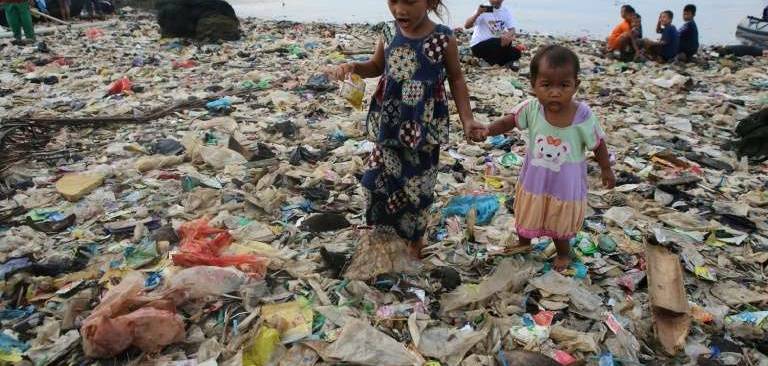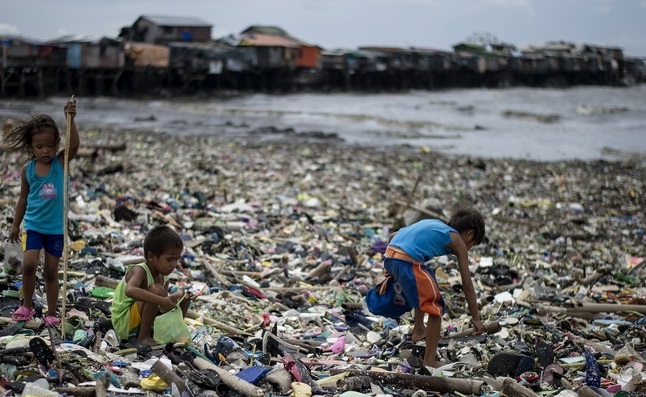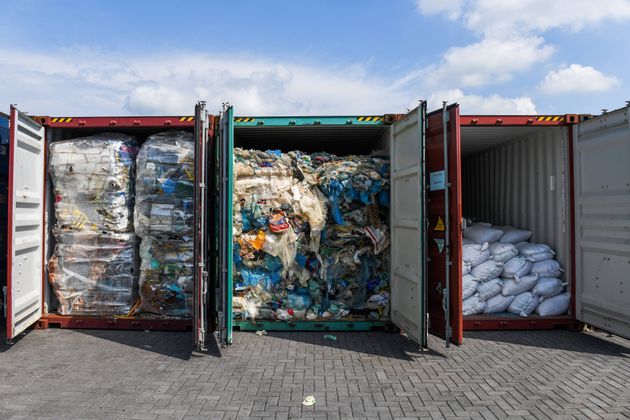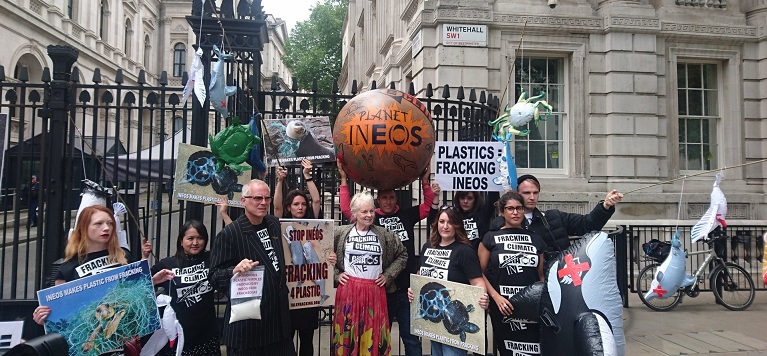
Overconsumption leads to an ever increasing number of plastic waste invading our planet. According to National Geographic since 2015, more than 6.9 billion tonnes of this waste has been produced. About 9% was recycled, 12% incinerated and 79% was accumulated in landfills or in nature. "
While the production of plastic has increased considerably since the turn of the century, the management of waste has not been taken into account by consumer countries. As a result, the marketing of recycling has steadily increased between rich and poor countries.
For many years, rich countries exported their plastic and toxic waste to poor countries, mainly Asia. The agreement was made on the destination of this waste which had to be "recycled". But everything suggests that this was a blind way for rich countries to get rid of their bulky clean, toxic or contaminated waste.
Since the 1990s, the global plastic waste market has been growing steadily. China was the world's top recycling destination and reportedly received nearly half of these exports. In 2016, it still received 600,000 tonnes of plastic waste every month. Tired of having become the trash can of the countries of the North, China followed in the footsteps of India, which at the beginning of 2016, imposed a partial ban on the import of plastic waste on its territory. In July 2017, China strengthened its criteria for accepting waste on its territory. In March 2018, the Asian giant banned the import of most of this waste. Most of this clean or toxic or contaminated waste that could not be recycled, was incinerated or otherwise thrown away. Many have ended up in our oceans.
A kick in the global recycling market that has stirred the whole planet. Rich countries were left with tons of plastic waste and the inability to manage it.
What about this global plastics recycling battle?
The majority of this waste comes from countries like Japan, the United States, Germany, England and France which were the biggest exporters in 2019.
Following China's restrictions, other countries have embarked on the recycling business. Turkey, Vietnam, Malaysia, Thailand have become the biggest importers of plastic waste.
As we have often discussed in previous articles, more than 75% of this waste ends up incinerated, either in nature and in the oceans.
After China, Vietnam, the Philippines, Malaysia, India, Taiwan and Thailand have become the new landfills of the world. Vietnam is one of the worst plastic polluters in the world. Beyond managing their own waste stocks, they must manage the increase in plastic waste arriving from rich countries. The peasants trade in their farmland by using it to receive tons of plastic. This rush towards plastic recycling has seen thousands of metamorphosed sites flourish to sort, collect, wash, cut, melt bags and plastic films to make granules which are then left to be transformed again. Thousands of people live in the vapors of polyethylene and caustic soda.

Even if small entrepreneurs in these countries plan to make a fortune in recycling plastic waste, the fact remains that these countries are far from optimizing its management and even less from respecting environmental regulations. Real ecological disaster is occurring in these countries. These wastes are responsible for contaminations of waterways, fires, atmospheric pollution, serious illnesses, illegal dumping, among others.
Also in Malaysia, hundreds of plastic waste processing factories rose from the ground and began to emit toxic fumes making cities unbreathable.
Faced with the scale of this pollution, these countries have also taken measures to limit imports.
It was then that exports shifted to other countries such as Indonesia, Turkey and more and more African countries, notably Kenya. Indonesia received 283,000 tonnes of waste in 2018, an increase of 141% between 2017 and 2018, while its internal production is even higher. (Almost 9 Million tonnes).
Today the Indonesian government has revised its regulations and returns the containers to their countries of origin if a prior consent has not been established between the countries on the categories of exported plastics. Waste must be sorted and checked.

The difficulty for businesses to manage plastic waste harms the environment, leaving deposits of plastics and microplastics on land, in rivers and oceans around the world. An alarming increase in the illegal trade in plastic waste has emerged. INTERPOL's latest report on global plastic waste management highlights an illegal increase in waste shipments to Southeast Asia that aims to hide the exporting country of origin via transit countries. False final destinations are initially declared and the waste passes through the hands of several brokers, making it difficult to identify the countries of origin.
The report also highlights the link between criminal networks and legitimate pollution management companies that serve as a cover for illegal operations. The increase in counterfeit documents, fraudulent registrations, erroneous declarations and successive transhipments continues to increase. When they are not burned, buried underground or dumped illegally in illegal dumps. Anyway is good to get rid of this waste without getting caught.
Despite legislation that goes in the direction of reducing plastics, companies are struggling to change their habits. Even though the food industry is making efforts to manage recycling, it is not attacking the source. The latest report from the Changing Markets foundation denounces the most polluting companies on the planet, despite the implementation of government measures aimed at combating the proliferation of plastic waste. These companies do not hesitate to place the responsibility for their pollution on consumers and the authorities. Topping the list we have:
Coca-Cola and Pepsico, then Nestlé, Danone, Procter & Gamble, Unilevers, Colgate-Palmolive and Mars, many others follow behind…
Added to this are the objectives of ever greater growth in plastic production in the petrochemical industry. Dow, Exxon Mobil, Basf, Eni still have a bright future ahead of them. According to Jens Althoff, director of the Paris office of the Heinrich Böll Foundation, the London-based petrochemical company Inéos and Europe's biggest plastic polluter. And yet these companies are under virtually no public pressure, even as a few protesters try to make their voices heard.

"Global plastic pollution is one of the most pervasive environmental threats facing the planet today, and its proper regulation and management is of utmost importance to global environmental security," said the President. of INTERPOL's Environmental Compliance and Enforcement Committee Advisory Board, Calum MacDonald, who is also the Executive Director of the Scottish Environmental Protection Agency (SEPA).
Now we must also fight against crime linked to plastic pollution!
INTERPOL's global pollution response team works on an ongoing basis with specialist agencies in 194 countries to detect and disrupt pollution-related crime and dismantle the groups that cause it. INTERPOL-led operations, training and capacity building help law enforcement agencies take down criminal polluters.
There is no doubt that there is real awareness, but still too insufficient in view of the extent of pollution and its consequences, by the world population. International law has taken up the subject by adopting several measures. Once again, it is up to our manufacturers, producers and users of plastics to want to apply them. As part of the circular economy, recycling makes it possible to recover waste and reinject it into the initial production process.
Focus more on affordable recycling measures, achievable by all citizens. Imposing and controlling this circular economy would make it possible to recycle all of this waste in order to reprocess it.
Going beyond the technical limits of degradation of certain forms of plastics, or reorienting their primary use to give them a second life are all solutions that we must put in place.
We all agree on one point: we need to change our habits, and it will only be through laws that we will speed up the process.
Posted on 2021-05-09 10:30








Comments